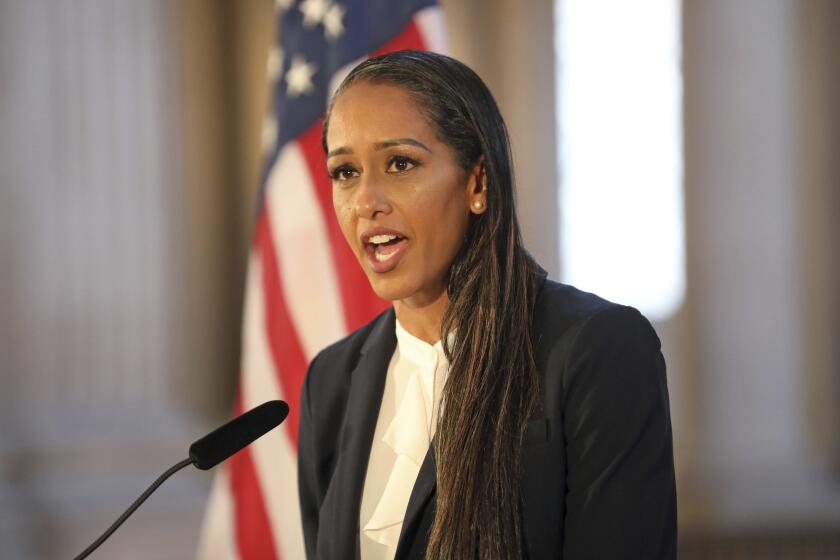Dist. Atty. Brooke Jenkins gets a crash course in San Francisco politics
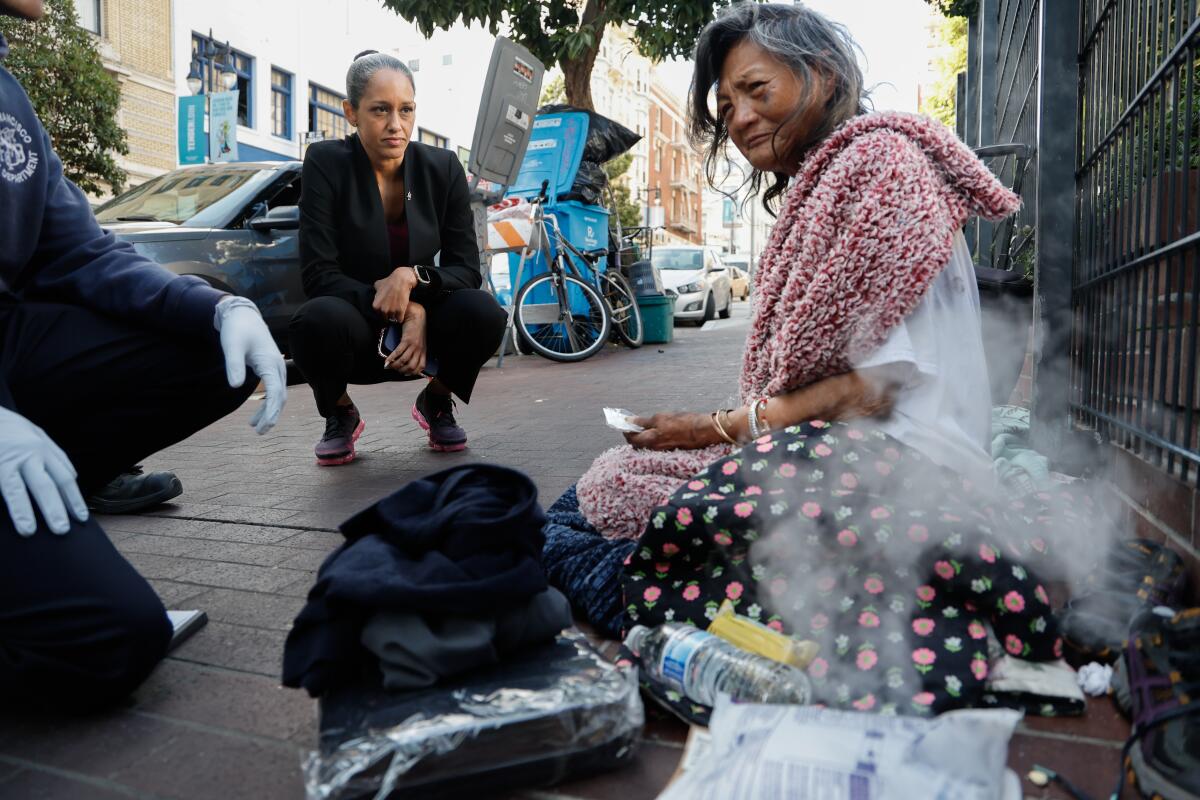
- Share via
SAN FRANCISCO — During an annual Chinatown community event hosted by the police department in September, interim San Francisco Dist. Atty. Brooke Jenkins moved through the crowd like a rock star, stopping to oblige selfie requests and chat with locals gathered at Portsmouth Square for a discussion on public safety and crime.
Jenkins, 41, is frequently recognized on San Francisco’s streets these days — at a family-friendly NoPa block party, during an art walk on Clement Street or a Noe Valley pumpkin-carving contest judged by drag queens.
The political newcomer surged to celebrity in July as Mayor London Breed’s pick to replace progressive Dist. Atty. Chesa Boudin after voters ousted him from office a month earlier. But much like her predecessor, Jenkins has become one of the city’s most controversial political figures.
For some, Jenkins has ushered in a necessary crackdown on crime in a city struggling with drug overdoses and violent attacks against Asian Americans and vulnerable populations. For others, she’s a political pawn with questionable ethics, intent on dragging the city back to a failed tough-on-crime era of decades past.
Jenkins ascended to power roughly nine months after she quit Boudin’s office and joined the campaign to recall him amid a surge in frustration over crime and homelessness. Since then, she’s been accused of having a too-cozy relationship with the mayor, sharply rebuked by the criminal justice reform movement and criticized for being paid more than $100,000 as a consultant to a nonprofit organization closely connected to the recall campaign.
Jenkins is now running in the Nov. 8 election to serve the remainder of Boudin’s term through 2023. She’s favored to win, according to two recent polls, against a longshot candidate to her right and two other Democrats who’ve earned the party’s endorsement in the city’s ranked-choice election.
Whoever succeeds will take official charge of an embattled office that’s often blamed for the city’s most pervasive problems, fairly or not.
Jenkins said she’s up to the task.
“[San Franciscans] are happy about what I’ve done so far. They are fed up with the drug dealing,” she said. “They are fed up with San Francisco being a place that is now made fun of in the news across the country, because of the crime situation. They are tired of their businesses suffering.”
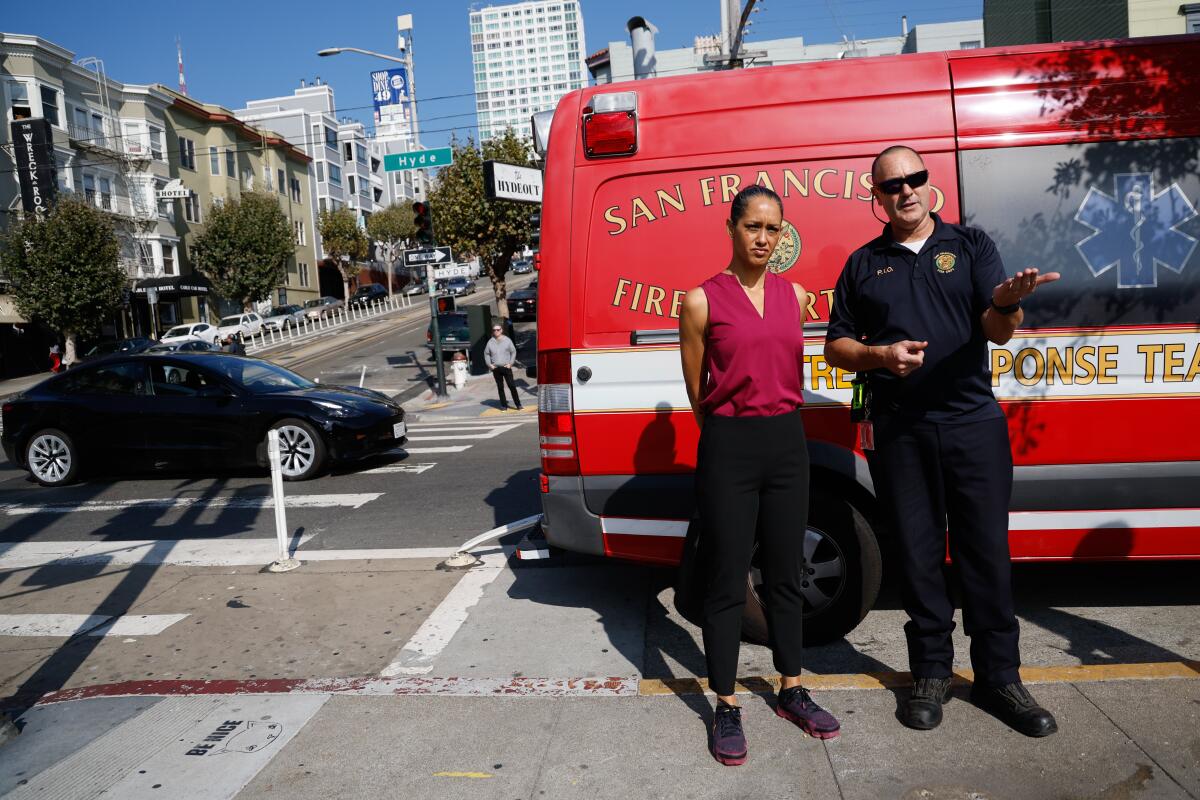
Jenkins took over the prosecutor’s office amid deep political polarization in San Francisco, a favorite punching bag of Republicans and ring-wing media outlets. To its critics, the city is a liberal haven where homeless people defecate in the streets and where even House Speaker Nancy Pelosi’s husband isn’t safe from a violent attack.
Local politics often devolve into ideological discord, not between Republicans and Democrats, but between moderates and far-left progressives. Earlier this year, voters recalled three school board members over concerns with classroom closures during the COVID-19 pandemic, among other issues.
“She was instantly elevated to one of the most high-profile offices in San Francisco, in one of the most hyper-political cities in the country,” said Max Szabo, a former assistant district attorney and spokesman for then-San Francisco Dist. Atty. George Gascón. “It’s kind of like going from peewee football to quarterbacking the Super Bowl.”
Jenkins promised to restore law and order in San Francisco as the city’s top cop, largely by strengthening penalties for repeat fentanyl dealers and mitigating the drug crisis in beleaguered neighborhoods. But during a recent two-hour ride-along with a city crisis response team, Jenkins realized “how much work we need to do.”
One call came for a homeless man outside a grocery store who appeared to be injured. Another for an inebriated woman who bartered with the crisis intervention team for more booze before accepting a blanket. The third call was for a man on his hands and knees on the sidewalk who received a medical check and a ready-made meal of rice and beef.
And in between each stop, the van zipped past countless homeless individuals asleep on the sidewalks or using drugs.
“We certainly aren’t going to prosecute our way out of this situation,” she said after the ride ended.
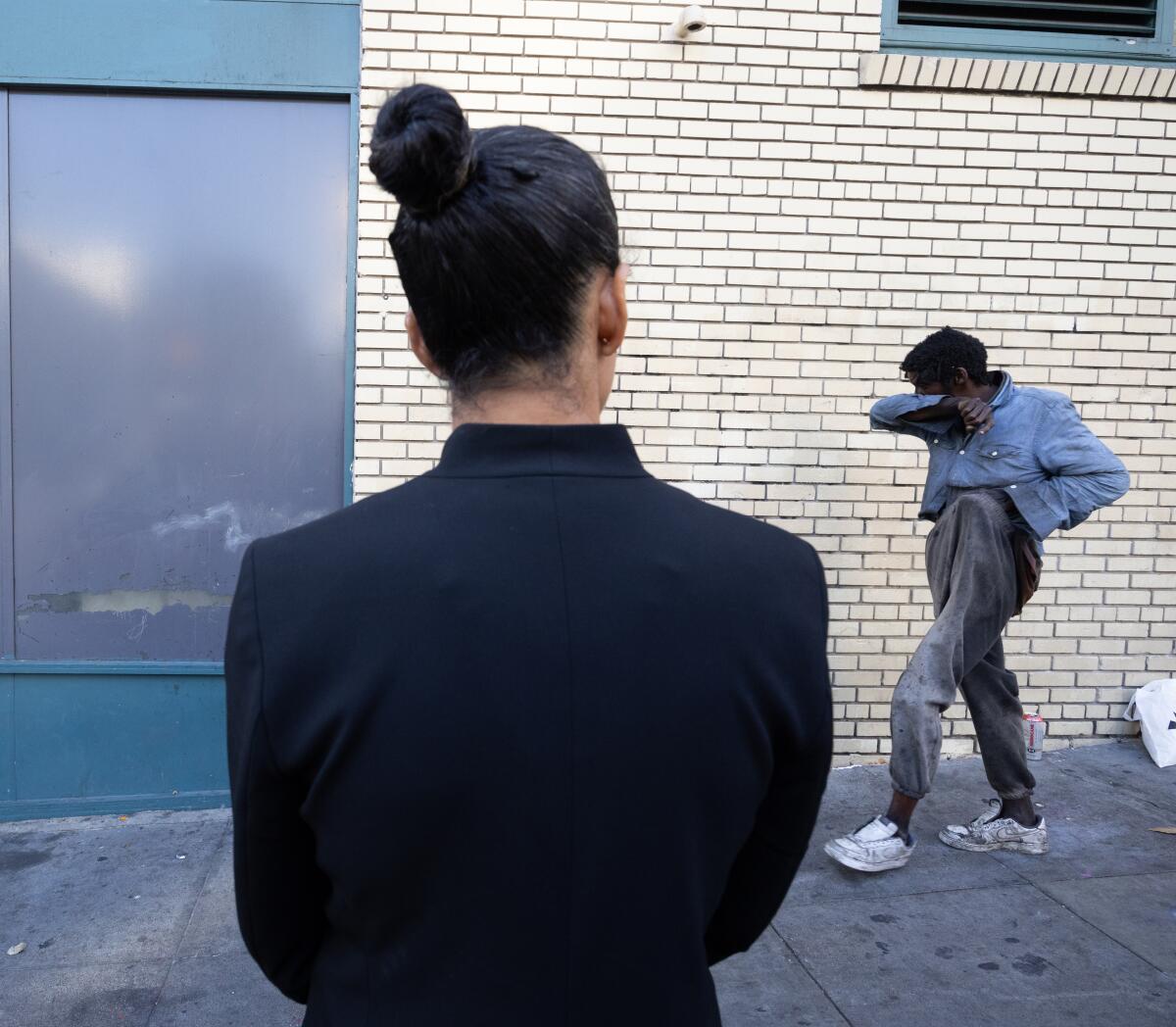
It was in San Francisco and under Gascón that Jenkins learned how to be her version of a “progressive prosecutor.”
“George Gascón in San Francisco took violent crime extremely seriously, but also was very clear with us that he wanted to promote alternatives to incarceration,” Jenkins said. Gascón was elected Los Angeles County district attorney in 2020.
That balance shifted under Boudin, she argued, in a way that abandoned accountability in favor of “blanket policies.” Boudin did not respond to requests for comment.
Jenkins said she agreed with the “spirit” of Boudin’s ambition to reform the criminal justice system. She considers treatment programs and trade work opportunities in certain cases, she said, along with mental health services.
To a point.
One of Jenkins’ new policies modified Boudin’s ban against charging 16- and 17-year-olds as adults to allow it for a limited number of “heinous crimes,” such as murder, forcible sexual assault or mass shootings. She also revoked more than 30 open plea offers for repeat fentanyl dealers, and announced that she would allow her prosecutors to pursue possible murder charges against alleged fentanyl dealers whose products caused an overdose death.
“It’s not enough to say, ‘I just don’t believe in incarceration.’ Certainly people can call that progressive,” Jenkins said. “But if you’re going to put ‘prosecutor’ behind it, you actually need to be willing to prosecute crime.”
The changes have ignited swift opposition.
Emily Lee, co-director of San Francisco Rising, an advocacy organization that promotes civic engagement in communities of color, said Jenkins’ decision to allow for juveniles to be charged as adults contradicts science and data on teenage brain development. She said the new policy has disappointed youth organizations and families of incarcerated people who “feel like that’s throwing away the lives of people who deserve a second chance and need more opportunity.”
Lee also said families of individuals killed by police officers have raised concerns with how the district attorney’s office is handling their cases, and she questioned whether Jenkins’ new policies have done much to reduce crime. Lee said it’s going to take more than one elected official to address the root causes of the city’s most vexing problems.
“If D.A. Jenkins is a progressive prosecutor, the term has lost all meaning,” said former San Francisco Police Commissioner John Hamasaki, who is running to Jenkins’ left in the race for district attorney. “Restarting the drug war, restarting the prosecution of children, prosecuting low-level drug users instead of offering them treatment, I think all of those things are objectively regressive.”
Hamasaki earned the first-choice endorsement of the San Francisco Democratic Party, while civil rights attorney Joe Alioto Veronese was recommended as the party’s second choice. Hamasaki said he’s running to bring management experience to the district attorney’s office and to root out corruption in city government, including the prosecutor’s office, where he said Jenkins is beholden to the mayor.
Jenkins has strongly denied the allegation. But she’s also found herself on the defensive over the six figures in fees she earned as a consultant for the nonprofit organization Neighbors for a Better San Francisco while publicly portraying herself as a volunteer for the similarly named Neighbors for a Better San Francisco Advocacy, a political group that worked to remove Boudin. The two groups reported the same San Rafael address and billionaire William Oberndorf, who helped finance the recall, is listed as a director or president in official records.
Jenkins said she treated the roles as “two separate things,” but acknowledged she could have disclosed her role as a paid consultant sooner.
On Wednesday, Jenkins again faced a wave of criticism after the nonprofit news site Mission Local reported that right before she left the district attorney’s office last year under Boudin, Jenkins emailed copies of sensitive police reports to the personal email account of a colleague who also resigned to join the recall campaign.
The confidential information included the lengthy criminal history of a a vehicular manslaughter suspect who was featured in the recall campaign as an alleged example of Boudin’s soft-on-crime policies.
After Dist. Atty. Chesa Boudin was recalled, his replacement will be Brooke Jenkins — a prosecutor who quit Boudin’s office to join the campaign against him.
Jenkins learned very quickly that, in a city known for gleefully devouring its own leaders, possessing both deft political instincts and a thick skin is mandatory for success. That toughness, though, ran in the family and became a driving force in her life.
Jenkins, who is Black and Latina, was raised in Fremont and Union City by a single mom who worked two jobs and attended college night classes to become a high school counselor. Jenkins did not meet her dad, an immigrant from El Salvador who now lives in Germany, until she was 21.
“I feel like being raised by my mom only made me a lot stronger in a lot of ways, and I wouldn’t change anything about my circumstances,” she said. “But my dad and I, thankfully, have been able to really forge a strong relationship and a strong bond.”
Jenkins competed in the 400-meter hurdles on the track and field team at UC Berkeley, then graduated from the University of Chicago Law School. She worked in private practice,then served as the assistant director of enforcement for the National Collegiate Athletic Assn. before she was hired in 2014 by the San Francisco prosecutor’s office.
She worked as the department’s designated hate crimes prosecutor and was later promoted to the sexual assault unit. In 2020, Boudin elevated her to the homicide unit.
Jenkins said she was uniquely qualified to handle murder cases. She could relate to victims’ grieving families, she said, because she and her husband’s first baby, a son they named Justice, died of natural causes soon after he was born.
“I think that stems from being a parent who has had to bury my own child and really recognizing that extreme level of loss when somebody takes the life of your child and you’re left with nothing,” said Jenkins, who now has two young children, a son and daughter.
Forrest Myers, a real estate developer who met Jenkins in middle school, said Jenkins is a “lawyer by heart,” but was also raised in a community that valued collaboration, diversity and hard work.
“She is super down to earth,” Myers added, describing Jenkins as a “hamburger-chicken-wing-Sunday-on-the-couch-football-East-Bay girl.”
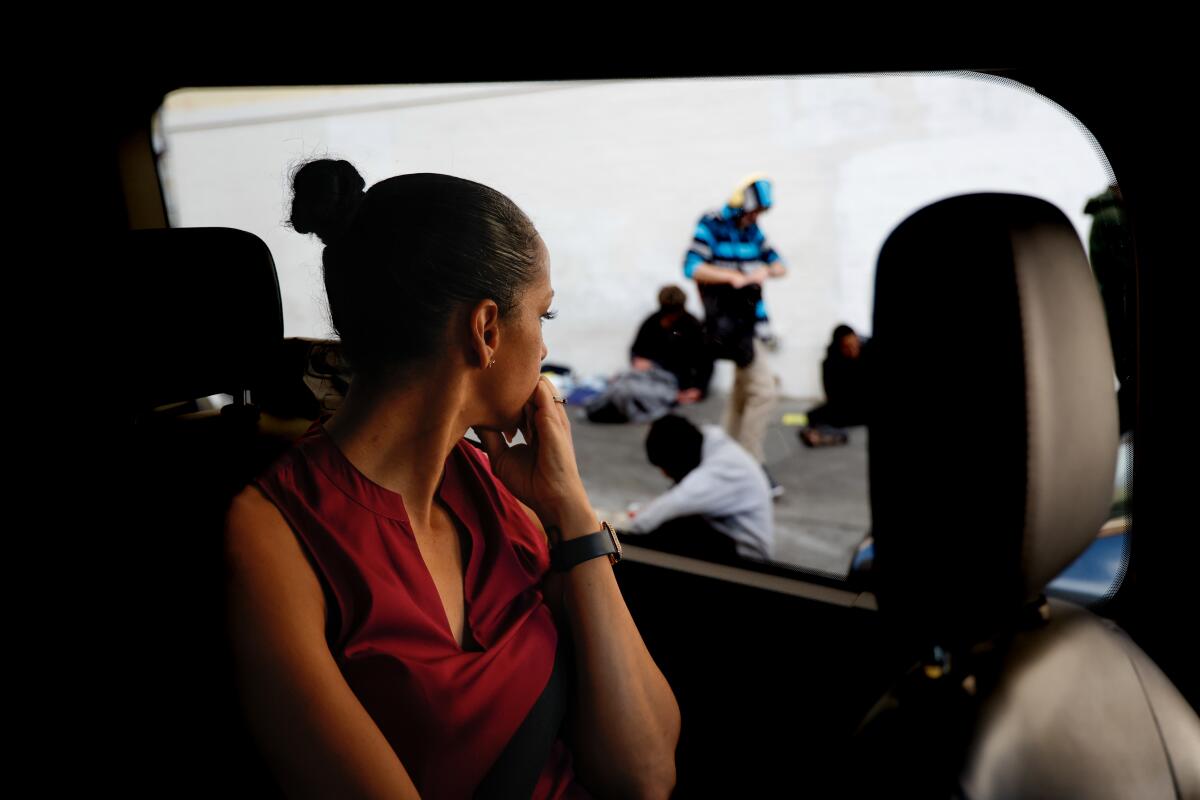
In California, Jenkins could be considered a moderate, even liberal on some points.
She said she supports overdose prevention programs, known as safe injection sites, given the fentanyl crisis on San Francisco’s streets. Unlike some of her fellow district attorneys, Jenkins hasn’t called for the repeal of Propositions 47 and 57, two controversial voter-approved initiatives that aimed to lower California’s prison population. She said the policies have worked as expected.
“I think she gets caricatured as somehow being conservative, and she’s not,” said state Sen. Scott Wiener (D-San Francisco), who endorsed her campaign. “It’s clear to me that she’s a lot more progressive than people think on criminal justice issues. She also believes in accountability, which is important. I think she’ll strike that balance.”
But she might not have much time.
Jenkins has put herself in a “difficult position,” Szabo said, after she became “the public face of a recall that blamed D.A. Boudin for the city’s ills.”
“Now she has the reins, and she can plead patience all she wants, but this is an electorate that threw D.A. Boudin out just two years into his first term when overall crime was down,” Szabo said. “In this town, in this climate and especially in that job, she does not have long.”
Jenkins said she’s focused on why she was appointed. San Franciscans are feeling increasingly discouraged with the direction of the city, according to a recent San Francisco Chronicle survey of more than 1,600 residents.
Forty-five percent said they’d been a victim of theft in the last five years, while nearly a quarter said they’d been threatened or physically attacked.
“I think people have reached the tipping point,” Jenkins said, “that this can’t be the identity of our city.”
More to Read
Sign up for Essential California
The most important California stories and recommendations in your inbox every morning.
You may occasionally receive promotional content from the Los Angeles Times.
